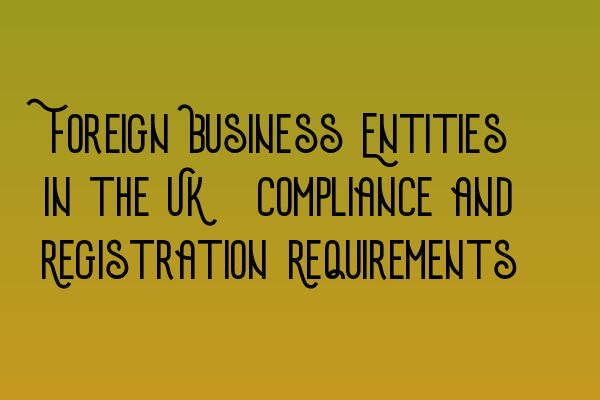Foreign Business Entities in the UK: Compliance and Registration Requirements
Are you a foreign business entity looking to establish a presence in the UK? Understanding the compliance and registration requirements is crucial for ensuring a smooth transition into the UK market. In this blog post, we will explore the various steps and considerations involved in setting up a foreign business entity in the UK.
1. Determine the Appropriate Business Structure
Before registering your foreign business entity in the UK, it’s important to consider the most suitable business structure for your operations. The choice of business structure will impact your compliance obligations, tax liabilities, and the level of personal liability you may be exposed to. The common business structures in the UK include:
– Limited Liability Company (LLC): A popular choice for foreign businesses due to its separate legal entity status, limited liability for shareholders, and flexibility in management structure.
– Branch Office: This option allows foreign businesses to establish a physical presence in the UK without creating a separate legal entity. However, the parent company remains liable for the obligations and liabilities of the branch office.
2. Choose a Suitable Business Name
Once you have decided on the appropriate business structure, you need to choose a unique business name for your entity. The Companies House, which is the UK’s official register of companies, has specific rules and restrictions regarding the naming of companies. It’s important to ensure that your chosen name complies with these rules and is not misleading or similar to existing business names.
3. Register with Companies House
Registering your foreign business entity with Companies House is a key step in establishing a legal presence in the UK. The registration process involves submitting the necessary documents and information, such as:
– Certificate of incorporation or registration from the home country
– Memorandum and articles of association
– Statement of compliance
– Registered address in the UK
The registration process can often be complex, and it’s advisable to seek legal assistance or consult with a business registration service provider to ensure accuracy and compliance.
4. Appoint a Registered Agent
Foreign business entities are required to appoint a registered agent in the UK. The registered agent serves as the official point of contact for legal and administrative matters. They must have a physical presence in the UK and be available during regular business hours.
5. Obtain the Necessary Permits and Licenses
Depending on your business activities, you may need to obtain specific permits or licenses to legally operate in the UK. This applies to businesses in certain sectors such as finance, healthcare, and hospitality. Research and identify the appropriate regulatory bodies and ensure that you comply with all licensing requirements.
6. Comply with Tax and Accounting Regulations
Foreign business entities operating in the UK are subject to UK tax regulations. It’s important to understand your tax obligations and ensure proper compliance, including registering for UK taxes, filing tax returns, and paying the applicable taxes. Consider consulting with a tax advisor who specializes in international taxation to navigate the complex tax landscape.
Additionally, you must maintain proper accounting records and financial statements in accordance with UK accounting standards. Familiarize yourself with the reporting requirements and deadlines to avoid any penalties or legal issues.
7. Stay Compliant with Employment Laws
If you plan to hire employees in the UK, you must comply with UK employment laws and regulations. This includes providing employees with proper contracts, adhering to minimum wage requirements, ensuring a safe working environment, and fulfilling any statutory employee benefits.
8. Stay Updated on Changes in Legislation
Legislation and regulations relating to foreign business entities in the UK can change over time. It’s crucial to stay updated on any changes that may impact your compliance obligations. Regularly review the relevant government websites and consult with legal professionals to ensure ongoing compliance.
Entering a new market can be both exciting and challenging for foreign businesses. By understanding and fulfilling the compliance and registration requirements in the UK, you can establish a strong and legally compliant presence. Remember, seeking assistance from professionals can help streamline the process and ensure smooth operations.
Now that you have an understanding of the compliance and registration requirements in the UK, you may be interested in furthering your preparation for the upcoming SQE exams. Check out these related articles:
– SQE 1 Practice Exam Questions: Test your knowledge and assess your readiness for the SQE 1 exam with our practice quizzes.
– SQE 1 Practice Mocks FLK1 FLK2: Get a feel for the actual exam experience by practicing with our realistic mock exams for SQE 1.
– SQE 2 Preparation Courses: Explore our comprehensive courses designed to support your preparation for the SQE 2 exam.
– SQE 1 Preparation Courses: Enhance your knowledge and skills with our tailored courses to excel in the SQE 1 exam.
– SRA SQE Exam Dates: Stay informed about the exam dates and deadlines for the SRA SQE exams to plan your study schedule effectively.
We wish you the best of luck in your business endeavors and SQE exam preparations!

